Keir Starmer Will Face “Immense Pressure” To Allow More Time For Assisted Dying Debate If Bill Passes
MPs will get a vote on the Assisted Dying Bill in the Commons on November 29 (Alamy)
4 min read
Parliamentary experts have predicted that Keir Starmer will be forced to give MPs more time to debate the issue of assisted dying if the bill looking legalise it passes next week.
The Government will face “immense pressure” to expand the amount of time available to scrutinise the draft legislation despite it being led by Labour backbencher Kim Leadbeater, according to Dr Ruth Fox, director of the Hansard Society.
There has been growing disquiet in Westminster about such a large and consequential policy change being introduced via the mechanism of a Private Members' Bill, a constrained and niche process, rather than by the Government itself bringing forward legislation.
Contentious social and ethical measures have been introduced this way in the past, such as decriminalising homosexuality and legalising abortion. More recently, however, changes such as allowing same-sex marriage have been brought forward by governments.
This week, Britain’s longest-serving MPs, Labour’s Diane Abbott and Conservative Sir Edward Leigh, issued a joint call arguing that the assisted dying bill is being rushed through Parliament and urging the Commons to reject it on 29 November.
Speaking to The Rundown podcast from PoliticsHome, Fox — an expert in parliamentary procedure — said she was “not entirely sure Keir Starmer perhaps understood the Private Members' Bill process entirely” when he first pledged to allow time for a debate and a vote on assisted dying when he was Leader of the Opposition.
She said the debate is "causing the Government huge problems" because ministers had not anticipated such significant opposition to using a Private Members' Bill to legislate on assisted dying.
"They look back to the history of social legislation, like the abolition of the death penalty, the abortion bill, and so on and think' oh well, they were Private Members' Bills, so that's fine we can use that route',” she said.
“But procedures in the House of Commons are different to what they were in the 1960s.
"Procedures, particularly for government bills, have changed, but for Private Members' Bills they have not and public expectations of the legislative process have changed.”
Fox explained that while stakeholders would usually provide evidence to MPs as part of the legislative process, when it comes to Private Members' Bills there is no provision to hear evidence from those with expertise.
“The difference between now and the 60s is that to get those Private Members' Bills through, even though sometimes the government was officially neutral on them, as they are on the assisted dying bill, they did step in to provide time or to take measures to enable MPs to have more time to scrutinise those pieces of legislation,” she said.
“And I don't think they perhaps appreciated for the Assisted Dying Bill, that that's where the pressures are going to come, that they're going to be under immense pressure if it does pass Second Reading to do exactly the same.”
 Labour MP Kim Leadbeater's bill on assisted dying is facing opposition over a lack of time for scrutiny and debate (Alamy)
Labour MP Kim Leadbeater's bill on assisted dying is facing opposition over a lack of time for scrutiny and debate (Alamy)
Fox was supported by fellow procedural expert Dr Daniel Gover, senior lecturer in politics at Queen Mary University in London, who said there is far less pre-legislative scrutiny of a Private Members' Bill, highlighting “we don't yet have a publicly-available impact assessment” of the plans to allow for assisted dying.
Speaking to the podcast he said: “The other category is then what happens later on in the process, when it's before Parliament, and there the key issue is the lack of time.
“The key issue is it's not just the lack of time, but the inability to make available additional time for a particular stage on a bill.”
Gover explained that if the bill reaches its report stage, there will be very little time for MPs to propose and discuss amendments and that supporters may be tempted to rush it through this stage to avoid the bill essentially being pushed to the back of the legislative queue.
Prime Minister Starmer is expected to vote for the bill next week having previously expressed support for legalising assisted dying. Cabinet ministers including Transport Secretary Lou Haigh, Culture Secretary Lisa Nandy and Energy Secretary Ed Miliband have all said they intend to vote for the bill led by the MP for Spen Valley.
A number of Cabinet ministers have said they intend to vote against it, however — including Health Secretary Wes Streeting, whose public interventions have been criticised by Labour figures including Leadbeater.
In a recent interview with The House magazine, Leadbeater said she was "disappointed" that Streeting "came out to speak about the bill before he had even seen the bill".
The Health Secretary had told Times Radio that legalising assisted dying – as proposed by Leadbeater in her Private Members’ Bill – would have “resource implications” that would “come at the expense of other choices”.
